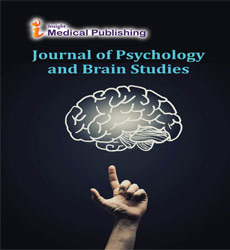Postpartum Depression Psychotherapy for Mothers
Anthony P. Monaco*
Department of Human Genetics, University of Oxford, Oxford, United Kingdom
- *Corresponding Author:
- Anthony P. Monaco
Department of Human Genetics
University of Oxford, Oxford, United Kingdom
E-mail: anthony.monaco@well.ox.ac.uk
Received Date: November 07, 2021; Accepted Date: November 12, 2021; Published Date: November 17, 2021
Citation: Monaco AP (2021) Postpartum Depression Psychotherapy for Mothers. J Psychol Brain Stud Vol.5 No.11:51.
Editorial
During pregnancy and the year after birth, women may experience a wide range of emotional experiences. In some situations, it might cause depressed symptoms that necessitate therapy and supportive approaches. Individual psychotherapy and counselling with exploratory, participatory techniques were the most often used interventions in low- and middle-income (LAMI) nations. The goal of this study is to look into the evidence around the impact of such interventions on enhancing women's and newborn mental health in moms suffering from postpartum depression. Psychiatric or psychological difficulties, of varied severity and manifestations, are fairly frequent in the prenatal, natal, and postnatal (perinatal) periods. Postpartum psychiatric disorder is more common in low and middle-income nations, among women who are at higher risk due to their gender or who have a psychiatric history. There is no obvious cause for the emergence of prenatal psychiatric illnesses. It may be caused by a combination of genetic predisposition and hormonal changes, which are influenced by numerous risk factors such as unplanned pregnancy, living without a partner, financial difficulties, stressful life events, child care-related stressors, and congenitally deformed infants.
Postnatal depression is one of the most frequent perinatal mental health issues, with rates ranging from 13% in the first few weeks to 20% of mothers in the first year after the delivery of their child. A considerable number of women will experience depression for the first time during their pregnancy. In Western civilizations, postpartum depression affects roughly 10-15% of all moms. According to recent epidemiological studies, postpartum depression affects 15.8 percent of Arab women, 16 percent of Zimbabwean women, 34.7 percent of South African women, 11.2 percent of Chinese women, 17 percent of Japanese women, and 23 percent of Goa women in India. PPD is more prevalent in women who have a history of major depression or mood disorder and/or a family history of major depression or psychiatric illness, teenage pregnancy, less or inadequately literate mothers, mothers who smoke, mothers who have a history of thyroid abnormality, mothers who have a low birth weight baby, and so on. Women who are perfectionists or obsessive-compulsive are also at risk.
Psycho-educational interventions, such as cognitive behaviour therapy and interpersonal therapy, that promote problem solving, coping skills, role transitions, interpersonal skills, addressing the need for support systems, framing a sense of personal agency, and helping to reframe unhelpful thinking patterns, have consistently proven effective in the management of Common Perinatal Mental disorders (CPMD) Several controlled studies have demonstrated the usefulness of several psychotherapy approaches in the treatment of mild to moderate depression, including cognitive, dynamic, and interpersonal therapy. While there are various quantitative techniques studies that investigate the effect of psychological and psychosocial therapies, this review aims to identify the same from contemporary quantitative evidences.
A literature search and systematic review were thus carried out with the goal of analysing systematically the evidence surrounding the impact of such therapies on enhancing women's and newborn mental health in moms suffering from postpartum depression. Evidence suggests that psychosocial and psychological interventions, when compared to usual postpartum care, are effective in reducing perinatal depression in high- income countries; however, Tripathy proposed a group-based intervention by a community-based approach, with a focus on postnatal care, breastfeeding, infant care, and practical support through problem-solving and group psychotherapy techniques, which were found to be quite effective in an Indian setting. Deliveries will be prevalent in the majority of places in India, where women live in joint families and congested households, and interventions involving the entire family will be common.
Perinatal mental diseases are common and widespread, regardless of whether the country is high, middle, or poor income. Because childbirth, role transitions, and/or related psycho-socio-economic conditions are the precipitating or risk factors, prevention strategies should be considered and implemented by integrating perinatal psychiatric components in obstetric care and making it accessible to the community, as it is a right of every woman to be mentally and physically comfortable before, during, and after childbirth. To facilitate understanding of earlier approaches in prenatal mental disorder, reviews can include earlier studies as well. Qualitative research can potentially be included in future studies.
Open Access Journals
- Aquaculture & Veterinary Science
- Chemistry & Chemical Sciences
- Clinical Sciences
- Engineering
- General Science
- Genetics & Molecular Biology
- Health Care & Nursing
- Immunology & Microbiology
- Materials Science
- Mathematics & Physics
- Medical Sciences
- Neurology & Psychiatry
- Oncology & Cancer Science
- Pharmaceutical Sciences
